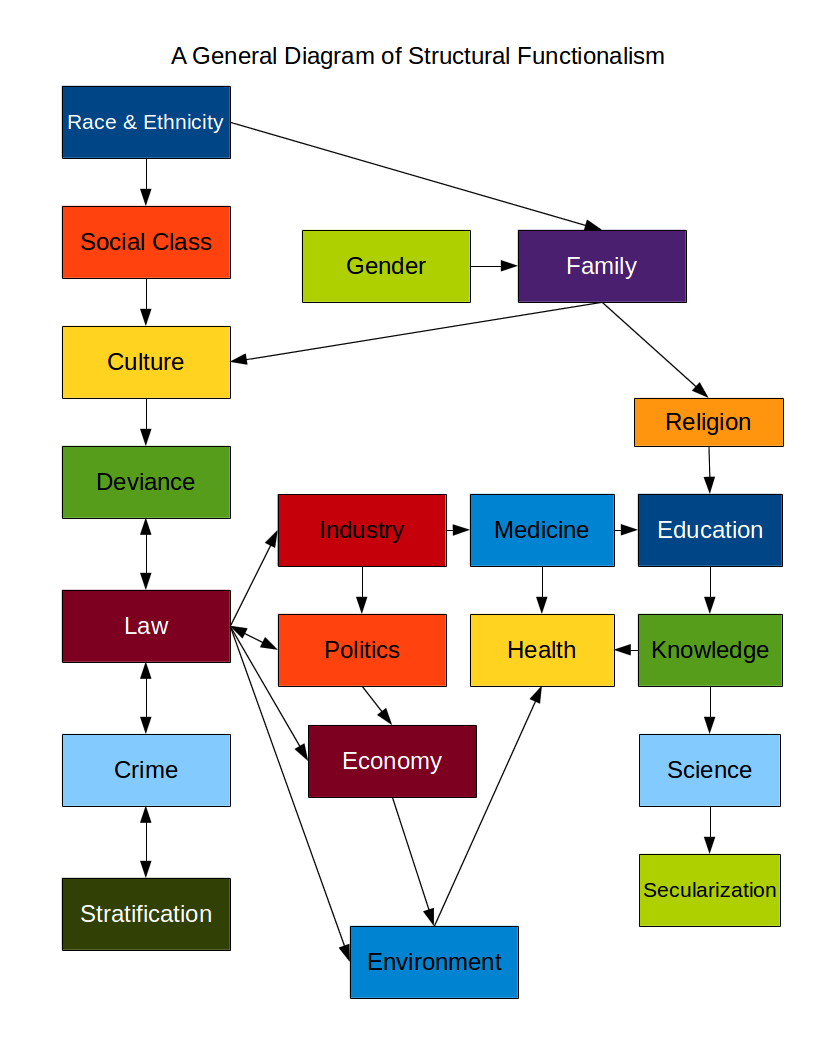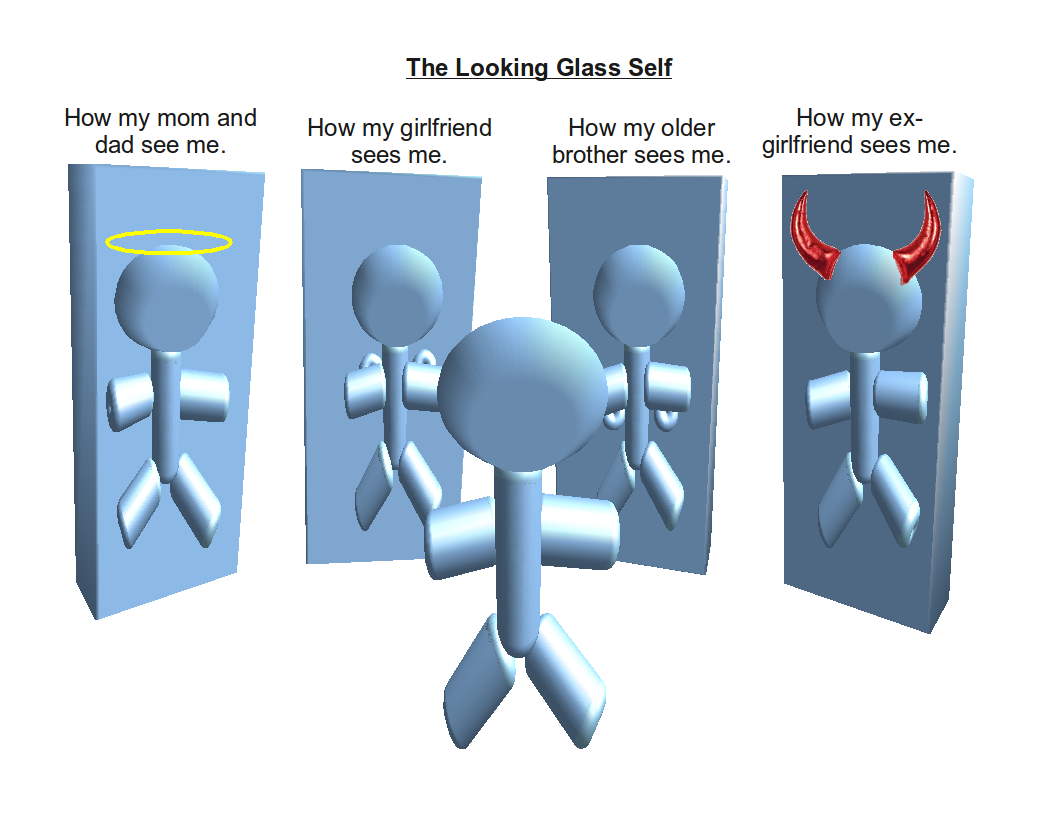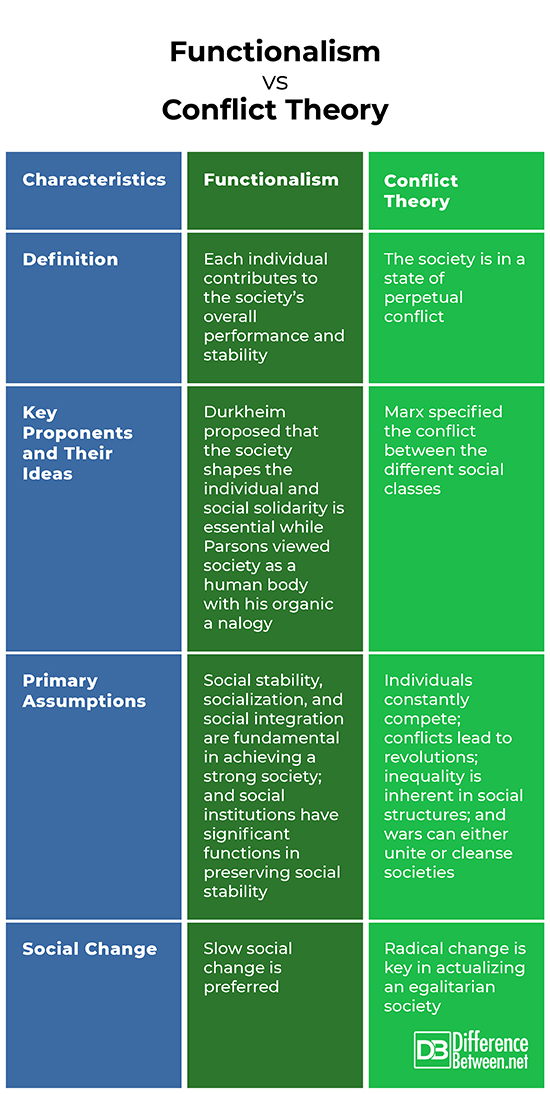Difference Between Functionalism and Conflict Theory
Both functionalism and conflict theory are macro theories which try to explain how societies work. Functionalism proposes that each individual contributes to the society’s overall performance and stability. In comparison, conflict theory suggests that due to the competition for resources, the society is in a state of perpetual conflict. The following discussions further delve into their distinctions.

What is Functionalism?
Functionalism, or the functionalist perspective, is one of sociology’s major theoretical perspectives; it proposes that each individual contributes to the society’s overall performance and stability (Crossman, 2020). It focuses on the macro-level since it views society as more than the sum of its parts. The society as composed of interdependent components which exist to fulfill vital roles. Hence, if one unit or institution malfunctions, the whole society is affected. For instance, the family, which is the smallest unit of the society, functions to rear law-abiding citizens who can also work for other institutions such as education, healthcare, and economy. The family is also expected to pay taxes which are financing the government’s projects for the society. If families malfunction, the whole society’s stability and productivity will be affected. In line with this, functionalism is described as a structural consensus theory. This means that there is a social structure which fundamentally influences the members of the society; and that a stable social structure defines a successful society. Also, value consensus, as evidenced by the people’s agreement of norms and values, is essential in fostering cooperation towards progress.
Two of the key functionalist thinkers are Emile Durkheim, a French sociologist, and Talcott Parsons, an American sociologist (Thompson, 2016). Durkheim proposed that the society shapes the individual and social solidarity is essential. The people are heavily influenced by the mores, laws, beliefs, customs, language, and other cultural elements. Also, individuals need to feel that they are a part of something bigger than themselves to create a sense of solidarity. In addition, Durkheim suggested that too much freedom, characterized by unclear morals, leads to anomie, a state of confusion. Regarding Parsons, he viewed society as a human body; he had an organic analogy. Just like body parts, institutions have their functions and boundaries. Furthermore, Parsons emphasized that value consensus is the basis for a society’s order.

What is Conflict Theory?
Conflict theory suggests that due to the competition for resources, the society is in a state of perpetual conflict. This was first proposed by Karl Marx, a German philosopher and sociologist. He specified the conflict between the people who have a majority of the resources and the poor or working class who are the majority of the people who only have a minority of the resources.
The following are the four primary assumptions of conflict theory (Chappelow, 2020):
Competition
Members of the society constantly compete for both tangible and intangible resources. Rather than cooperation, competition is the default status of human interactions.
Revolution
Due to the conflict between social classes, revolutions arise. This paves way for radical changes instead of gradual evolutions.
Structural Inequality
Inequalities of power is inherent in the structure of societies and human relationships. This is characterized by the enjoyment of more power and resources of the privileged classes. Hence, the members of the upper class tend to work to maintain such structure.
War
Wars can either cleanse or unite societies; they can eliminate boundaries or eliminate a society altogether.
Difference between Functionalism and Conflict Theory
Proposition/Definition
Functionalism proposes that each individual contributes to the society’s overall performance and stability. In comparison, conflict theory suggests that due to the competition for resources, the society is in a state of perpetual conflict.
Key Proponents and Their Ideas
Two of the key functionalist thinkers are Emile Durkheim and Talcott Parsons. Durkheim proposed that the society shapes the individual and social solidarity is essential while Parsons viewed society as a human body with his organic analogy. On the other hand, conflict theory was first proposed by Karl Marx who specified the conflict between the people who have a majority of the resources and the poor or working class, the majority of the people, who only have a minority of the resources.
Primary Assumptions
The primary assumptions of functionalism include: social stability, socialization, and social integration are fundamental in achieving a strong society; and social institutions have significant functions in preserving social stability. As for conflict theory, its primary functions include: individuals constantly compete; conflicts lead to revolutions; inequality is inherent in social structures; and wars can either unite or cleanse societies.
Social Change
For functionalists, slow social change is preferred since rapid changes threaten social order. On the other hand, conflict theory sees radical change as key in actualizing an egalitarian society.
Functionalism vs Conflict Theory

Summary
- Functionalism and conflict theory are macro theories which try to explain how societies work.
- Functionalism proposes that each individual contributes to the society’s overall performance and stability while conflict theory suggests that the society is in a state of perpetual conflict.
- Two of the key functionalist thinkers are Emile Durkheim and Talcott Parsons while conflict theory was first proposed by Karl Marx.
- For functionalists, slow social change is preferred for stability while conflict theory sees radical change as key in actualizing an egalitarian society.
- Difference Between Hematoma and Melanoma - February 9, 2023
- Difference Between Bruising and Necrosis - February 8, 2023
- Difference Between Brain Hematoma and Brain Hemorrhage - February 8, 2023
Search DifferenceBetween.net :
Leave a Response
References :
[0]Chappelow, Jim. Conflict Theory. Investopedia, 2020. https://www.investopedia.com/terms/c/conflict-theory.asp
[1]Crossman, Ashley. Understanding Functionalist Theory. Thought Co., 2020. https://www.thoughtco.com/functionalist-perspective-3026625
[2]Thompson, Karl. Functionalism. Revise Sociology, 2016. https://revisesociology.com/2016/09/01/functionalism-sociology/
[3]Image credit: https://commons.wikimedia.org/wiki/File:General_Diagram_of_Structural-Functionalism.png
[4]Image credit: https://commons.wikimedia.org/wiki/File:The_looking_glass_self.png
